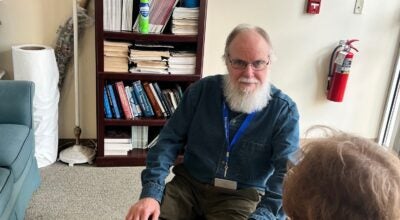To Your Good Health: Are new symptoms from return of previous tumor or dementia?
Published 12:52 pm Sunday, March 28, 2021

DEAR DR. ROACH: My mother was diagnosed with right frontal lobe meningioma 17 years ago when she was 83 years old. Surgery was successful in that most of it was removed and it was found to be nonmalignant. The doctor told us he couldn’t remove it completely, and that it was a very slow-growing type of tumor and wouldn’t return for about 20 years. Mom is now 100 and doing pretty well in general. She lives at home with family caregivers. We notice normal signs of aging … confusion, forgetfulness, some lack of concentration and not much interest in TV or reading anymore. While those behaviors are common signs of dementia for someone her age, sometimes her behavior reminds us of the time shortly before she was diagnosed with the tumor back in 2004. Should we have an MRI of her brain done? If we find that the tumor has grown back and is putting pressure on areas of her brain, what would you suggest? What will happen if we do nothing? — J.A.L.
ANSWER: A meningioma is the most common and (usually) benign tumor of the brain. Specifically, it’s a tumor of the meninges, the lining of the brain. These tumors cause problems by taking up space in the skull and compressing the brain.
It is impossible to say without imaging whether her symptoms are due to the meningioma returning, or due to some other process, such as Alzheimer’s or other dementia.
If you choose to get imaging, and the tumor has regrown to the point where it seems likely it could be causing symptoms, there are other choices besides surgery. Radiation therapy, including very precisely guided radiation, can be effective at relieving symptoms without performing surgery. Without treatment, symptoms will likely slowly progress.
The choice is yours, but I would tend to recommend getting the CT or MRI, so you at least know what you are dealing with. If it isn’t the meningioma, she might benefit looking for other causes, such as medications, or from medication therapy for dementia.
DEAR DR. ROACH: I am 75 years old with good vision. Recently, my optometrist noticed a few tiny spots that could signal the start of macular degeneration, and urged me to start taking vitamins to possibly slow the onset. I started taking Bausch and Lomb’s PreserVision supplement. It seems that the combination of ingredients in the product by themselves would be beneficial and are the only supplements or meds that I take.
My question is about the success of that product. I believe a recent article indicated that it could slow development of macular degeneration but not prevent it. Do you have any opinions on the product or the need for this type of supplement? — S.W.
ANSWER: People with diagnosed age-related macular degeneration and significant abnormalities in the retina should take the combination of vitamins and minerals proven to slow the onset and progression of AMD. The PreserVision is the only product that exactly replicates the combination used in the studies (called AREDS and AREDS-2) that showed this benefit. It is indeed not a cure but was beneficial, and along with smoking cessation, remains the only effective treatment for the dry form of AMD.
I don’t recommend taking the AREDS vitamin supplements to people who do not have diagnosed AMD. People with wet AMD require more aggressive therapy.
* * *
Dr. Roach regrets that he is unable to answer individual letters, but will incorporate them in the column whenever possible. Readers may email questions to ToYourGoodHealth@med.cornell.edu or send mail to 628 Virginia Dr., Orlando, FL 32803.
(c) 2021 North America Syndicate Inc.
All Rights Reserved





